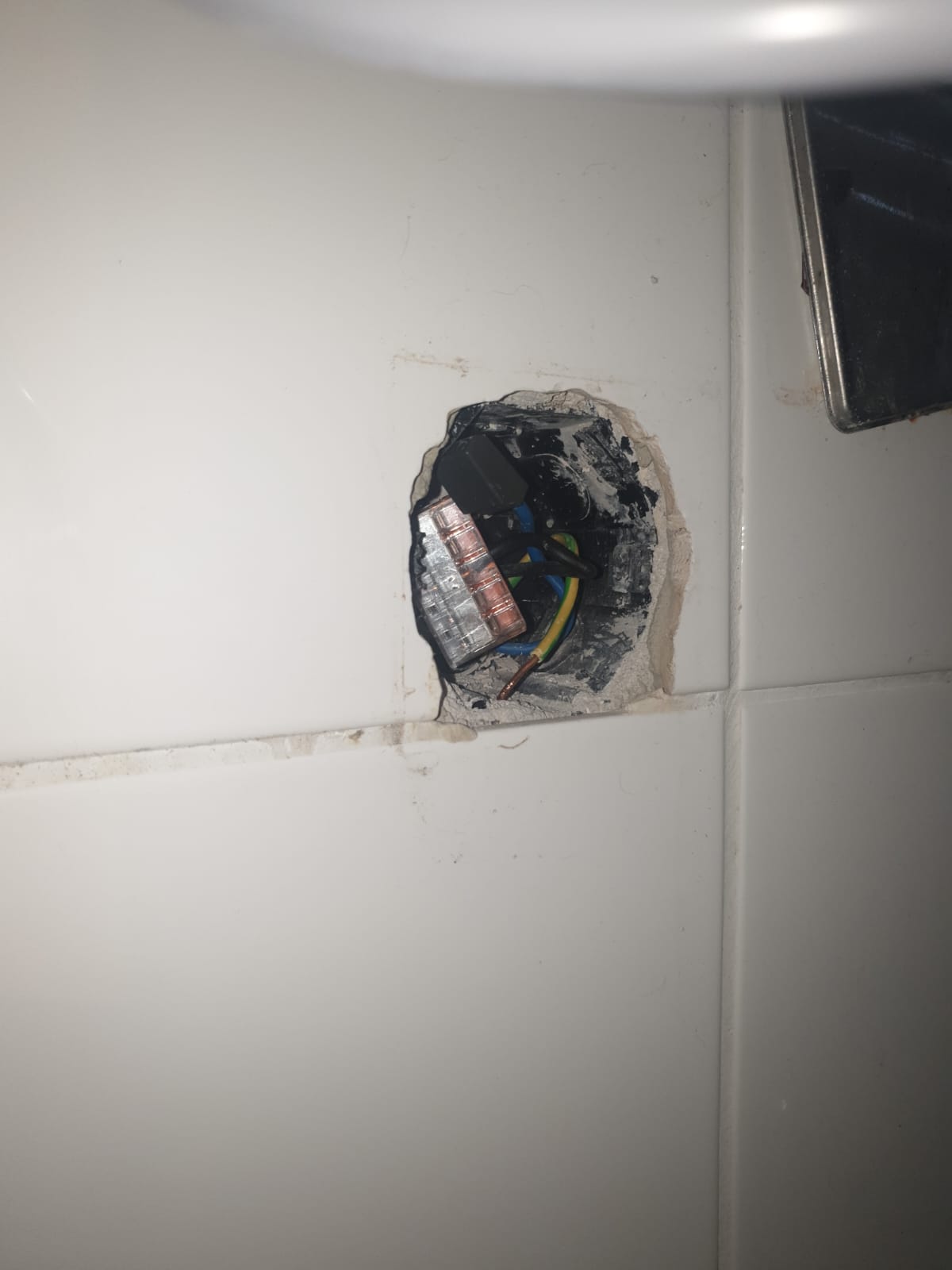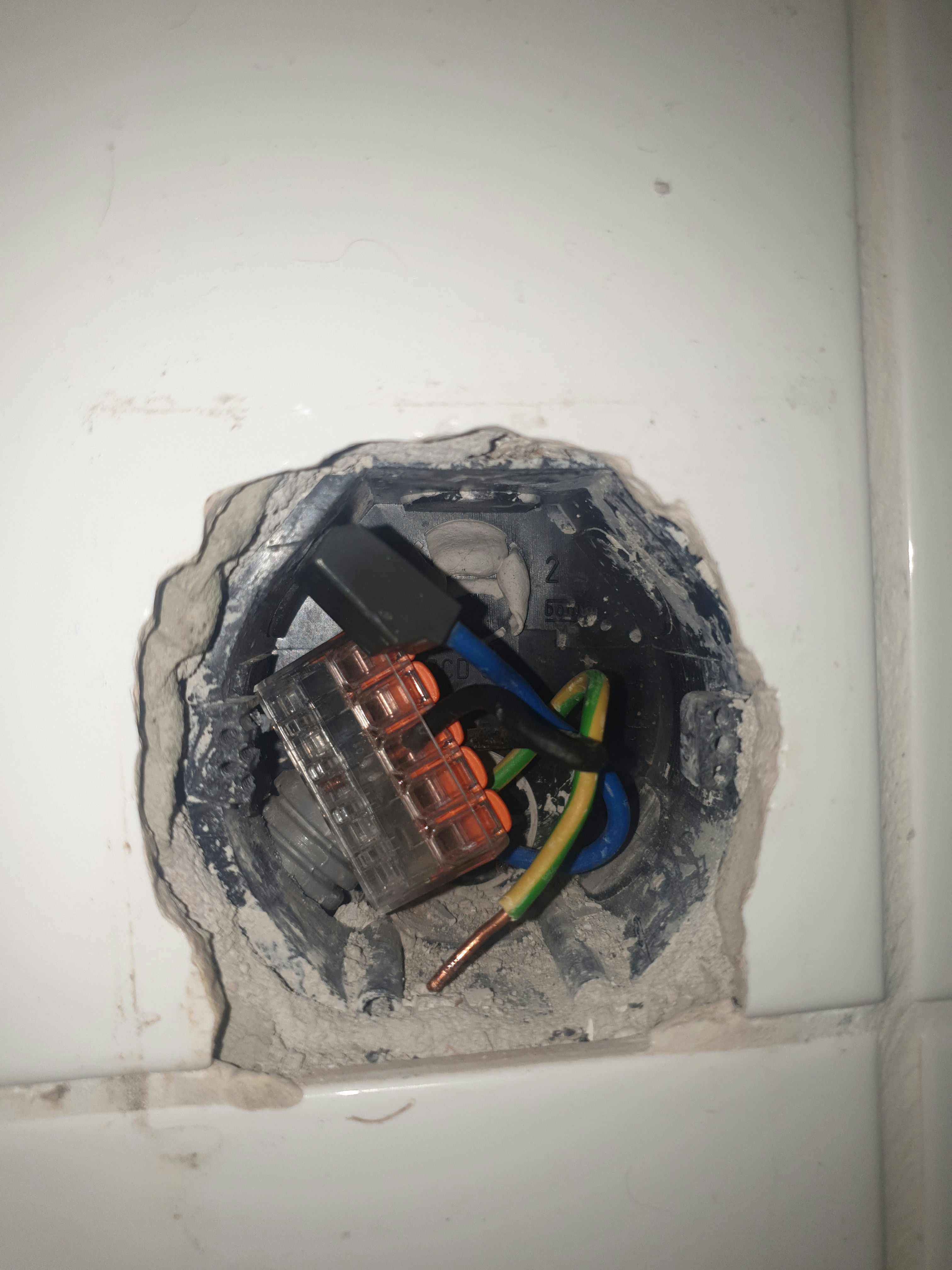The reason this outlet is open was because my washing machine was connected directly to it. I was advised to close it up by the people who took my old washing machine away. However i dont think i can wait until my friend has time to look at this. I likely cant turn the power on on the outlet at all right now i assume, how can i make sure myself that i can safely turn the power back on? electricity varies wildly in countries, im from austria if that helps.
Edit: a friend of mine who does some electrician work as part of his job (building pools) corroborated several of your comments (the only exposed cable is the grounding one and he offered to cover it up further at a later point after i put some tape on it)
thank you all for your answers and putting me at ease


Black and blue are the important ones, they’re the ones with the line voltage. From what I can see, they’re both OK, and they have wagos on them.
Under normal circumstances, the grounding wire (green/yellow) shouldn’t carry any voltage, but mistakes and faults happen. While you’ll most likely be fine just covering it as it is, I’d give that wire some treatment too: If you don’t have any wago clamps or similar, just snip off the exposed copper, and wrap some electrical tape around it just to be safe.
DISCLAIMER: I’m not in
AustraliaAustria (I’mEuropeanScandinavian), and I’m not a licensed electrician, let alone a licensed electrician inAustraliaAustria. I could be an internet terrorist who wants you to burn down your house for all you know.forgotten disclaimer: im also from europe, im fro austria
i see if work has electrical tape tomorrow
until than, dont turn on electricity?
since you said the black and blue ones are okay that should mean i could right?
Unless there’s a grounding fault somewhere in your house, you should be good. Until tomorrow is probably fine, just make sure that the exposed grounding wire isn’t touching anything conductive in the mean time, and you’re safe even if there is a grounding fault.
If you have a voltmeter, you can measure the voltage between the grounding wire and something conductive that is connected to actual ground, such as a copper pipe or similar. Voltage should be 0 in a healthy electrical installation.
PS: Any tape will do, to be honest, as long as it’s not conductive. The main d9wnside to using duct tape instead of electrical tape is that it’s not according to code, and it looks like ass. But I’ve done it.
i dont particularly care about looks but the store i work at should have some elec tape on sale
Since you wrote you are in Austria, I’ll write German as this topic is too important for misunderstanding.
Was du hier hast ist ein klassischer 230V-Anschluss mit 3 Kabeln:
- Schutzleiter PE (grüngelb)
- Neutralleiter N (blau)
- Phase (Schwarz)
Der Schutzleiter oder auch Erde führt in der Regel keinen Strom, sondern leitet Strom im Falle eines Schadens der Isolierung ab, bspw. damit dir das Metallgehäuse deiner WaMa keinen Schock verpasst.
Wichtig: Wie bereits erwähnt können Fehler bei der Verkabelung der Hauselektrik nicht ausgeschlossen werden - die Farben geben nur Hinweise, verlassen kannst du dich nur darauf wenn du mit einem Multimeter nach misst. Ansonsten musst du davon ausgehen, dass der freiliegende Kupferdraht Strom leitet.
! 230V Wechselstrom können tödlich sein !
Die beiden Leiter sind ordnungsgemäß mit einer Wago-Klemme abgeklemmt. Bevor du irgendwo rumspielst, unbedingt die Sicherung für die Dose rausmachen und auch den FI-Schutzschalter, sollte deine Wohnung einen haben.
Jetzt zur eigentlichen Frage. Ich bin kein ausgebildeter Elektriker und erzähle prinzipiell Unsinn, als random guy übernehme ich keine Verantwortung.
Das Ding sieht safe aus, mach dir keinen Kopf. Schau dass du die Dose zeitnah abdeckst wie bereits vorgeschlagen. Wenn das deine Badezimmer ist lüfte gut durch und lass da keine Feuchtigkeit eindringen. Das ist der selbe Anschluss, an dem du Deckenlampen anschließt. Nur an Drehstrom (E-Herd) darfst du als Laie nicht dran.
If you’re going to turn it on, you could put some wire nuts on the ends of each of the wires to keep anything from touching them. It’s always better to be safe than sorry, especially with electricity.
I assume that is the intended purpose of the wago connector over the hot line.
FWIW, here is the US, the ground wire is often completely exposed. As in, no colored jacket, just the bare copper throughout the entire run. Attached to ground at the breaker box, and attached to any grounding ports or metal boxes throughout the building.
You’ll be fine. As long as the wires don’t touch each other or get connected via some conductive liquid (e.g. water), nothing should happen. Cover it with something like electrical tape or some plastic cover for outlets just to be safe.
Put a cover on it like this (look for the right size, there are 2 - 3 different sizes)
https://www.bauhaus.at/schalterdosen/federdeckel-klein/p/12148379
put on like…on top of the hole?
It explains itself when you have it in your hand :)
There’s two spring-y extensions on the back which slide inside the electrical box.
deleted by creator
Is there a reason you need to turn the breaker on for that circuit? Is it connected to a circuit like your kitchen or something?
In my opinion, if you aren’t an electrician and can leave that circuit off until your friend or whoever can look at it, then just leave that circuit off. That is the safest approach.
Otherwise,so long as the wires are not touching and the black and blue wires are capped off and not touching bare metal, in theory you should be okay. Again, this is theoretical, it is possible that there may be something that I cannot see or think of that may cause a house fire by turning that circuit back on.
the bathroom switch is turned off, that socket is in the bathroom, they asked me to turn it off while they did their thing
Just call electrician, this is something where you don’t want to cut corners.
From my POV, I would say you are good. The dangerous blue and black wire are covered and yellow-green being exposed is not an issue. If you only have responsible persons in the house, you can turn it on without issues. You could also tape card board over it if you want to.
But keep in mind I’m not an electrician and give only my layman’s POV.
im the only person in the house and i am not responsiblefor real tho, as someone else said, ill be getting some electrical tape and cover the remaining cable up
In America we love our wire nuts. Capping off a loose cable is the only acceptable use of a wire nut to me.
I mean as long as they are in a wago connector and the earth wire has no chance to accidentally slip into one of the wagos there should be 0 risk. (Not a certified electrician, but a hobbyist)
In a situation like this I just cap all the wires. Some say the exposed ground is okay, but it’s even more okay if it’s capped. If the hot wires are capped, no need for ground, so ground gets capped, that type of deal


